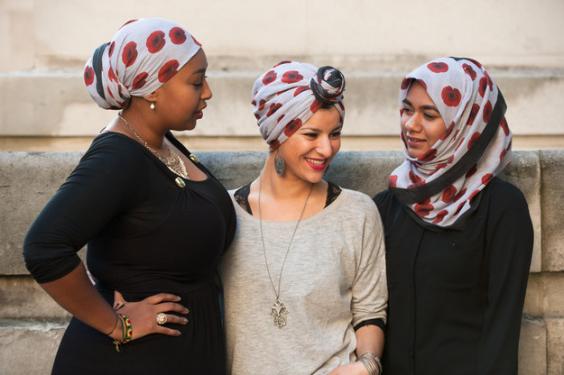No, I won't wear the "Poppy Hijab" to prove I'm not a Muslim extremist
I see this campaign for what it is: nothing but a cynical PR campaign to co-opt Muslim opposition to aggressive foreign policy

In the latest attempt at unabashed apologism, Muslim groups such as the Islamic Society of Britain (ISB) asked Muslim women to don a ‘Poppy Hijab’ in order to remember the Muslim soldiers that took part in the two world wars. Sughra Ahmed, president of the ISB suggested in 2014 that these hijabs would “take attention away from extremists”. This gimmick - relaunched for a 2015 cohort - has got to be the most ill-conceived of the recent spate of “we are not extremists” initiatives.
Marketing the poppy as a stance against extremism suggests that refusing the symbol is tantamount to ‘extremism’. A great selling point right there. Buy a £22 hijab to prove that you’re not a terrorist, a wannabe ‘jihadi bride’, planning on running off to Syria to find your Isis prince in blood-stained camouflage.
Admittedly, I almost thought I should buy one - because it might make walking through security checks at airports a little easier. I could get on a train without being accosted by a fully uniformed soldier, drunkenly telling me he joined the army to “kill dirty Muslims”.
I take issue with the fact that a symbol of my religion is being appropriated as a marketing tool for empire. My hijab is a visual sign of my religiosity and devotion to Allah and not a walking, talking billboard on which to showcase my patriotism and undying loyalty to Britain. No other religious group is pressured to prove their allegiance in the same way. Somehow I don’t think we’ll be seeing a budding Jewish designer marketing a poppy kippa anytime soon.
Every year we get the same old argument about the significance of the poppy. Some argue that the poppy does not represent war and patriotism but rather commemorates those servicemen who lost their lives in the world wars, while many, non-Muslims and Muslims alike, choose not to wear the poppy because they feel it has been appropriated by politicians and war-mongers to celebrate militarism.
Refusing to wear the poppy is not an ‘extremist Muslim’ stance; it’s an ideological position based on anti-war sentiment. Nobody would accuse a white person of extremism for refusing to wear one.
There’s been a noticeable push by the military, the government and Muslim groups to tell Muslims in Britain about how our brave forefathers laid down their lives for this country, preaching that we should be thoroughly ashamed of ourselves for not sacrificing ourselves in a similar vein. After all, we have a long history of being used as cannon fodder by our imperial masters, why stop now? It must be the rise of Radical Islam; we’ve all become ‘radical extremists’! Our grandfathers didn’t have this ‘problem’. They were proud of their subservience!
I see this campaign for what it is: nothing but a cynical PR campaign to co-opt Muslim opposition to aggressive foreign policy. Perpetual war needs perpetual support and nationalism, which is perceived as somewhat lacking in the British Muslim community. The military and government hawks need to “win hearts and minds”- and how better to do that then get us all walking around as advertisements for more war?
I don’t see an end to these types of conciliatory initiatives. What next? Why don’t I just take off my hijab, full stop, to prove the degree of my ‘integration’? Should I support every ill-conceived, disastrous war that Britain decides to join? Would that prove that I’m not dangerous?
I refuse.
I’ll always be seen as the ‘other’, regardless of how much I try to fit in. That’s something that needs to be addressed by wider British society. It requires open debate and discussion — not gimmicks.
If there’s one thing I am sure of, it is that given Britain’s never-ending lust for war in Muslim lands and the use of the poppy campaign to garner support and sympathy for the military, countless Muslim men who fought on behalf of Britain in the past would turn in their graves at the sight of their grandchildren wearing a poppy hijab.
This piece originally appeared on Media Diversified
Join our commenting forum
Join thought-provoking conversations, follow other Independent readers and see their replies
Comments